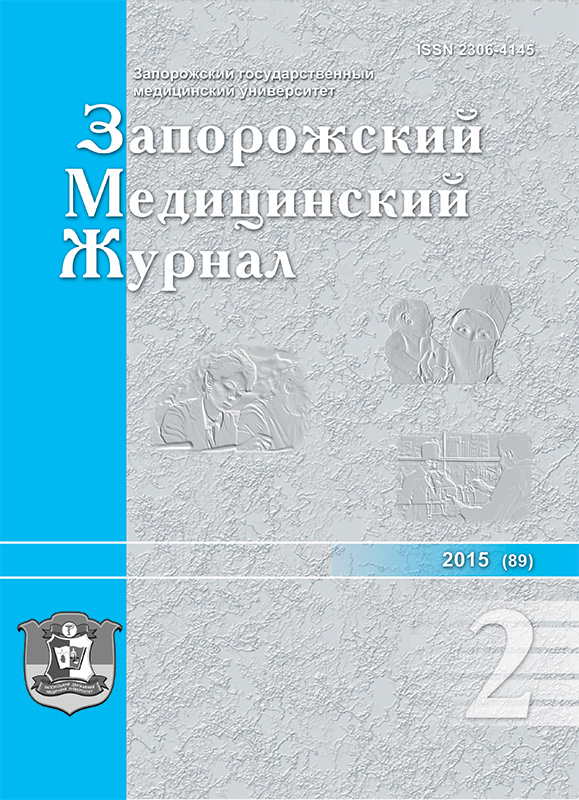Influence of artificial hypothermia and simvastatin on cognitive function in patients with intracranial aneurism hemorrhages
DOI:
https://doi.org/10.14739/2310-1210.2015.2.42019Keywords:
Intracranial Hemorrhages, Cognitive Aspects, Simvastatin, HypothermiaAbstract
Aim. Influence of prophylactic and treatment methods of secondary brain ischemia on cognitive function conditions is not studied enough.
Methods and results. To estimate influence of alternative prophylactic methods and methods of secondary brain ischemia on life quality in patients with intracranial aneurism hemorrhages after operation according to MMSE scale for cognitive function at hospital discharge was defined in 6 months and 2.5 years after treatment.
Conclusion. It was found that usage of prophylactic hypothermia and simvastatin didn’t influence on cognitive function. Usage of therapeutic hypothermia in patients with complicated progressive intracranial aneurism hemorrhages improves cognitive functions in the post operative period, especially, function of orientation, memory, speech, an order of instructions execution, especially 2.5 years after operative treatment.
References
Krylov, V. V., & Burov, S. A. (2000) Otdalennye rezul`taty khirurgicheskogo lecheniya anevrizm golovnogo mozga v ostrom periode krovoizliyaniya [Long-term results of surgical treatment of brain aneurysms in acute hemorrhage]. Nejrokhirurgiya, 4, 61–66. [in Russian].
Nasledov, A. (2011) SPSS 19: professional`nyj statisticheskij analiz dannykh [SPSS 19: professional statistical analysis]. Saint Petersburg. [in Russian].
Al-Khindi, T., Macdonald, R. L., Schweizer, T. A. (2010) Cognitive and functional outcome after aneurysmal subarachnoid hemorrhage. Stroke, 41(8), 519–536. doi: 10.1161/strokeaha.110.581975.
Anderson, S. W., Todd, M. M., Hindman, B. J., Clarke, W. R., Torner, J. C., Tranel, D., et al. (2006) Effects of intraoperative hypothermia on neuropsychological outcomes after intracranial aneurysm surgery. Ann Neurol, 60, 518–527. doi: 10.1002/ana.21018.
Chahal, N., Barker-Collo, S., & Feigin, V. (2011) Cognitive and functional outcomes of 5-year subarachnoid haemorrhage survivors: comparison to matched healthy controls. Neuroepidemiology, 37(1), 31–38. doi: 10.1159/000328647.
Folstein, M. F., Folstein, S. E., & McHugh, P. R. (1975) «Mini-mental state». A practical method for grading the cognitive state of patients for the clinician. Journal of psychiatric research, 12(3), 189–198. doi: 10.1016/0022-3956(75)90026-6.
Kirkpatrick, P. J., Turner, C. L., Hutchinson, P. J., Smith, C., & Murray, G. D. (2014) Simvastatin in aneurysmal subarachnoid haemorrhage (STASH): a multicentre randomised phase 3 trial. Lancet Neurol, 13(7), 666–675. doi: http://dx.doi.org/10.1016/S1474-4422(14)70084-5.
Latimer, S. F., Wilson, F. C., McCusker, C. G., Caldwell, S. B., & Rennie, I. (2013) Subarachnoid haemorrhage (SAH): long-term cognitive outcome in patients treated with surgical clipping or endovascular coiling. Disabil Rehabil., 35(10), 845–850. doi: 10.3109/09638288.2012.709909.
Lombard, F., Britz, G. W., & Warner, D. S. (2014) Simvastatin in subarachnoid haemorrhage: beyond the short-term. The Lancet Neurology, 13(11), 1073. doi: 10.1016/S1474-4422(14)70229-7.
Ogden, J. A., Mee, E. W., & Henning, M. (1993) A prospective study of impairment of cognition and memory and recovery after subarachnoid hemorrhage. Neurosurgery, 33(4), 572–586.
Otawara, Y., Ogasawara, K., Kubo, Y., Kashimura, H., Ogawa, A., & Yamadate, K. (2009) Comparison of postoperative cognitive function in patients undergoing surgery for ruptured and unruptured intracranial aneurysm. Surg. Neurol., 72(6), 592–595. doi: 10.1016/j.surneu.2009.06.016.
de Haan, R. N., Limburg, M, Bossuyt, P, J., van der Meulen, J. & Aaronson, N. (1995) The Clinical Meaning of Rankin ‘Handicap’ Grades After Stroke. Stroke, 26, 2027–2030. doi: 10.1161/01.STR.26.11.2027.
Rinkel, G. J, & Algra, A. (2011) Long-term outcomes of patients with aneurysmal subarachnoid haemorrhage. The Lancet Neurology, 10(4), 349–356. doi: http://dx.doi.org/10.1016/S1474-4422(11)70017-5.
Springer, M. V., Schmidt, J. M., Wartenberg, K. E., Frontera, J. A., Badjatia, N., & Mayer, S. A. (2009) Predictors of global cognitive impairment 1 year after subarachnoid hemorrhage. Neurosurgery, 65(6), 1043–1050. doi: 10.1227/01.NEU.0000359317.15269.20.
Downloads
How to Cite
Issue
Section
License
Authors who publish with this journal agree to the following terms:
Authors retain copyright and grant the journal right of first publication with the work simultaneously licensed under a Creative Commons Attribution License that allows others to share the work with an acknowledgement of the work's authorship and initial publication in this journal. 

